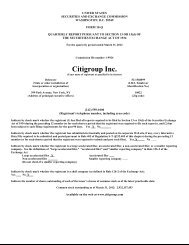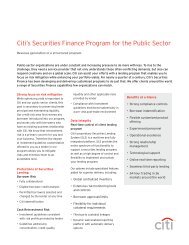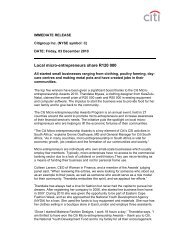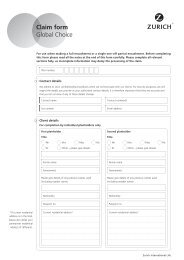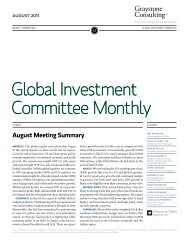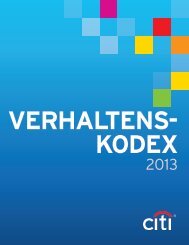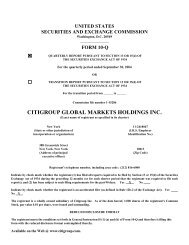Citigroup Inc.
Citigroup Inc.
Citigroup Inc.
You also want an ePaper? Increase the reach of your titles
YUMPU automatically turns print PDFs into web optimized ePapers that Google loves.
A securitized collateralized loan obligation (CLO) is substantially similarto the CDO transactions described above, except that the assets owned bythe SPE (either cash instruments or synthetic exposures through derivativeinstruments) are corporate loans and to a lesser extent corporate bonds,rather than asset-backed debt securities.Where a CDO vehicle issues preferred shares, the preferred shares generallyrepresent an insufficient amount of equity (less than 10%) and create thepresumption that the preferred shares are insufficient to finance the entity’sactivities without subordinated financial support. In addition, although thepreferred shareholders generally have full exposure to expected losses on thecollateral and uncapped potential to receive expected residual rewards, it isnot always clear whether they have the ability to make decisions about theentity that have a significant effect on the entity’s financial results becauseof their limited role in making day-to-day decisions and their limited abilityto remove the third-party asset manager. Because one or both of the aboveconditions will generally be met, we have assumed that, even where a CDOvehicle issued preferred shares, the vehicle should be classified as a VIE.Consolidation and Subsequent Deconsolidation of CDOsSubstantially all of the CDOs that the Company is involved with are managedby a third-party asset manager. In general, the third-party asset manager,through its ability to purchase and sell assets or—where the reinvestmentperiod of a CDO has expired—the ability to sell assets, will have the power todirect the activities of the vehicle that most significantly impact the economicperformance of the CDO. However, where a CDO has experienced an event ofdefault, the activities of the third-party asset manager may be curtailed andcertain additional rights will generally be provided to the investors in a CDOvehicle, including the right to direct the liquidation of the CDO vehicle.The Company has retained significant portions of the “super-senior”positions issued by certain CDOs. These positions are referred to as “supersenior”because they represent the most senior positions in the CDO and, atthe time of structuring, were senior to tranches rated AAA by independentrating agencies. These positions include facilities structured in the formof short-term commercial paper, where the Company wrote put options(“liquidity puts”) to certain CDOs. Under the terms of the liquidity puts, ifthe CDO was unable to issue commercial paper at a rate below a specifiedmaximum (generally LIBOR + 35 bps to LIBOR + 40 bps), the Companywas obligated to fund the senior tranche of the CDO at a specified interestrate. As of December 31, 2010, the Company no longer had exposure to thiscommercial paper as all of the underlying CDOs had been liquidated.Since the inception of many CDO transactions, the subordinate tranches ofthe CDOs have diminished significantly in value and in rating. The declinesin value of the subordinate tranches and in the super-senior tranches indicatethat the super-senior tranches are now exposed to a significant portion of theexpected losses of the CDOs, based on current market assumptions.The Company does not generally have the power to direct the activities ofthe vehicle that most significantly impact the economic performance of theCDOs as this power is held by the third-party asset manager of the CDO. Assuch, certain synthetic and cash CDOs that were consolidated under ASC 810,were deconsolidated upon the adoption of SFAS 167. The deconsolidation ofcertain synthetic CDOs resulted in the recognition of current receivables andpayables related to purchased and written credit default swaps entered intoby <strong>Citigroup</strong> with the CDOs, which had previously been eliminated uponconsolidation of these vehicles.Where (i) an event of default has occurred for a CDO vehicle, (ii) theCompany has the unilateral ability to remove the third-party asset managerwithout cause or liquidate the CDO, and (iii) the Company has exposure tothe vehicle that is potentially significant to the vehicle, the Company willconsolidate the CDO. In addition, where the Company is the asset managerof the CDO vehicle and has exposure to the vehicle that is potentiallysignificant, the Company will generally consolidate the CDO.The net impact of adopting SFAS 167 for CDOs was an increase inthe Company’s assets of $1.9 billion and liabilities of $1.9 billion as ofJanuary 1, 2010. The Company continues to monitor its involvement inunconsolidated CDOs. If the Company were to acquire additional interestsin these vehicles, be provided the right to direct the activities of a CDO (ifthe Company obtains the unilateral ability to remove the third-party assetmanager without cause or liquidate the CDO), or if the CDOs’ contractualarrangements were to be changed to reallocate expected losses or residualreturns among the various interest holders, the Company may be requiredto consolidate the CDOs. For cash CDOs, the net result of such consolidationwould be to gross up the Company’s balance sheet by the current fair valueof the subordinate securities held by third parties, whose amounts are notconsidered material. For synthetic CDOs, the net result of such consolidationmay reduce the Company’s balance sheet by eliminating intercompanyderivative receivables and payables in consolidation.246



